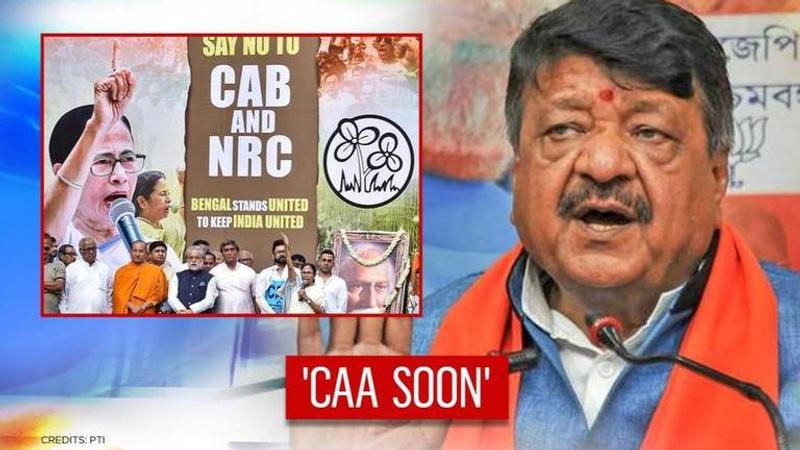Published 11:32 IST, December 6th 2020
On road to West Bengal polls, BJP's Vijayvargiya eyes 'CAA implementation from January'
In a big statement ahead of high-stakes West Bengal Assembly elections, Kailash Vijayvargiya said that the CAA is likely to be implemented from January 2021

In a big statement ahead of the high-stakes West Bengal Assembly elections, senior BJP leader and national general secretary of the party, Kailash Vijayvargiya, said that the Citizenship (Amendment) Act is likely to be implemented from January next year. Vijayvargiya, who is also the West Bengal in-charge of the BJP, said while addressing 'Aar Noy Anyay' (no more injustice) campaign that the Centre is keen to grant citizenship to the large refugee population in the state. He also accused the ruling Trinamool Congress government of not being sympathetic to the cause of the refugees.
"We are hopeful that the process of granting citizenship to refugees under the CAA will begin from January next year. The Centre has passed the CAA with the honest intention of granting citizenship to persecuted refugees coming to our country from neighbouring nations," he said in North 24 Parganas.
A section of BJP leadership in the state is apprehensive that the delay and confusion over CAA implementation might turn refugee voters, especially the Matua community, against BJP in the 2021 assembly elections. BJP state unit sources claim that the community had voted hands down in favour of the saffron party during the 2019 Lok Sabha elections, where the party had made significant inroads by winning 18 out of the total 42 seats.
Reacting to Vijayvargiya's comment, senior TMC leader and state minister Firhad Hakim said that the BJP is trying to fool the people of West Bengal. "What does the BJP mean by citizenship? If the Matuas are not citizens, how come they voted in assembly and parliamentary polls year after year? The BJP should stop fooling the people of West Bengal," he said. The Matuas, originally hailing from East Pakistan (present-day Bangladesh), started migrating to West Bengal in the 1950s, mostly due to religious persecution.
What is the Citizenship Amendment Act (CAA)?
The Citizenship (Amendment) Act (CAA) seeks to grant citizenship to non-Muslim migrants belonging to Hindu, Sikh, Buddhist, Christian, Jain and Parsi communities who came to the country from Pakistan, Bangladesh and Afghanistan on or before December 31, 2014. The Parliament passed the Citizenship Amendment Bill on December 11, 2019, and President Ram Nath Kovind gave assent to the Citizenship (Amendment) Bill, 2019 on December 12.
Anti CAA protests
After the bill was passed by the Parliament, widespread protest began, opposing the Act. The protest took a violent turn when clashes erupted between Delhi Police and Jamia Millia Islamia students. While students allege that Police used brutal force against them and Police allege that students stone-pelted. Thereafter, nationwide protests began against the implementation of CAA and against Police brutality with Delhi's Shaheen Bagh being the most prominent place. On February 24, clashes also broke out between CAA supporters and opposers and soon turned into a riot, killing 53 people and injuring over 200, as per official records. Kerala, Rajasthan, Punjab, Telangana, Madhya Pradesh and West Bengal have passed a resolution against CAA. Several other states like Maharashtra have openly opposed CAA-NRC-NPR and Bihar has passed a resolution in favour of old format of NPR.
Updated 11:32 IST, December 6th 2020




